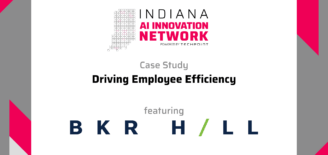Marketing at tech scale-up MOBI demands a constant ROI mindset
This is the third post in a three-part series on marketing at tech startups and scale-ups. Read the first post on marketing at tech startup Sigstr here and the second post on Torchlite here.
As startups and scale-up tech companies grow and scale, marketing becomes even more essential to the product and the branding of the company. And as a company adds more employees, marketers are often asked to assist with internal marketing and communications to keep teams up to date and informed as the culture and the product changes rapidly.
MOBI, an enterprise mobility solutions company located in Indianapolis — and the 2017 “Best of Tech” Mira Award winner for Tech Company of the Year — knows what it’s like to grow quickly. In September 2016, the company announced plans to add 521 jobs by 2020, which is one of the largest job expansions the state has seen alongside Salesforce and Infosys. Just this past month, MOBI hosted its annual user conference called Untethered, which our own Roger Shuman attended.
I caught up with Christi Vawter, Content and Public Relations Specialist at MOBI, to ask about how her department has grown to match the needs of the company.
Sara: How did you go about growing from one to seven employees?

Christi VawterContent and Public Relations Specialist
MOBI started with one external marketing consultant who was later brought in-house once it was determined he was a good cultural fit and there would be enough work to justify a full-time employee. As with most small organizations, the marketing team grew from one to two (then three) and continued to stay flexible — often tag-teaming each project with a “fire” status because that’s all they had time for — until it became clear that the key to scaling MOBI’s sales relied on building a digital presence. With that, the marketing team expanded to four members, and each began to take on specific roles and responsibilities.
Once the team began to take structure, processes and best practices began falling into place, and it was easier to get out of “firefighter” mode. Today, we have seven team members and, while we still have our fair share of fire drills, we operate more like a team of proactive scouts than firefighters.
Sara: What are the primary areas of focus for your marketing team?
Christi: MOBI’s marketing team is essentially split into three areas or teams: content and public relations; design and digital media; and events and social media.
Our content and public relations team is responsible for developing content that is relevant and valuable to our target audience. You can usually find this team working on developing a new conversion point for our website, writing a byline for a media opportunity, creating a new blog series, or working with another MOBI department to write new website or sales copy.
Our design and digital media team is responsible for bringing the MOBI brand to life visually. You can usually find this team designing our website, new emails, or online ads; creating custom graphics, videos, or presentations; or engaging others throughout the organization to graphically depict MOBI processes and procedures.
Our events and social media team is responsible for coordinating MOBI’s presence at industry trade shows across the world; organizing our annual user and industry conference, Untethered; running our corporate store, MOBI Merch; and managing all of MOBI’s social media channels.
Sara: How are your priorities aligned with the overall priorities for the growth of the company?
Christi: Our marketing team’s priorities are aligned with MOBI’s annual growth goals. We focus on generating marketing qualified leads that ideally turn into sales accepted leads. The marketing team focuses on generating these MQLs by producing valuable online content, uncovering timely public relations opportunities, attending relevant industry events, and building a reputation as subject matter experts with industry analysts.
At MOBI, we realize that marketing doesn’t just fall to the marketing team. As an organization, our goal is to deliver a consistent experience across the customer journey. This means that every MOBI employee, or MOBIan, is a brand ambassador and expected to live MOBI’s core values: Pay attention. Own it. Work together. Embrace change. Respect people. You’ll notice that collectively, our core values spell P.O.W.E.R. — that’s not a coincidence.
Sara: What advice would you give a tech company with 1-2 marketing people on how they should think about scaling their team?
Christi: Always think in terms of ROI — whether that investment is money, time, or other resources. Is what you’re working on driving revenue for your organization? Are you bringing in new leads with your strategy and tactics?
When it comes time to scale your team, think of where you can make the biggest impact, and then where your team has the biggest gap in current coverage. Do you think more social media engagement would increase website traffic? Maybe a social media coordinator is needed. Are tradeshows known as a great source of lead generation in your industry? Maybe it makes more sense to invest in a new hire willing to travel the country (or world!) and be a brand ambassador.
Knowing how quickly strategies can change in growing companies, it’s also important to look for new team members that can be flexible and have a “pitch-in-and-help-where-it’s-needed” attitude. Any successful marketing team will tell you that it succeeds (or learns by failing fast) together—as a team. Looking for individuals with similar work ethics and attitudes will prove beneficial when scaling the marketing team.
Sara: How do you collaborate amongst the rest of the organization? Such as product/tech teams, finance, administration?
Christi: MOBI has monthly go-to-market meetings that gather select members from all departments in the organization—including product, sales, marketing, customer success, development, global services, data management, channel, logistics, and operations. The meetings are divided so that each department receives time to present what it’s been working on, update attendees on processes or projects, and/or announce new initiatives. We have found that this enables each department to cover a broad range of topics at a high level or dive deep into one topic and provide a demonstration.
One of my biggest concerns when joining MOBI’s marketing team was that I did not have a technical degree. I didn’t know the latest coding language or understand a lot of “tech speak.” As it turns out, most of the marketing team members were in the same boat. To help bridge the gap between the developers who are physically building our software and those of us who must decipher the features and benefits of the software and translate them to the public, we started holding monthly product meetings in addition to the go-to-market meetings. In these meetings, the marketing team shows development how their hard work is being marketed to our target audience. Developers share projects they are working on that will enhance the software and bring additional features and benefits to our customer administrators and end users. The goal of these meetings is to create an open dialog between the departments that (like many organizations) have traditionally operated in silos.


